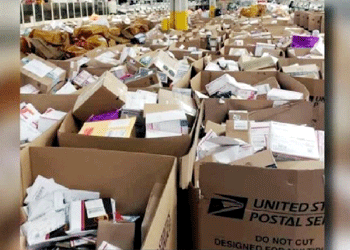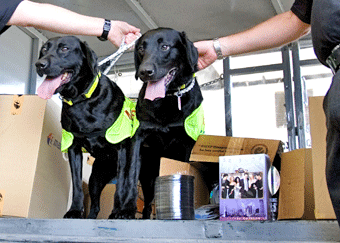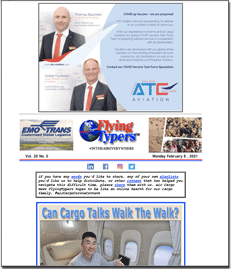|
After the air cargo security measures were
put into place after 9/11, most of the security measures for 100% screening
were placed on the flights carrying passengers and cargo. Almost 20 years
later, measures are moving forward under new TSA regulations that will
require 100% screening on international freighter flights departing the
United States.
All Cargo Plus One
The U.S. security measures on freighters
have been more concerned about keeping people off the main deck that might
be able to overtake the cockpit crew.
Charlie Shipped Himself Air Cargo
 E-tu Charlie—Charlie the stowaway flew aboard a Kitty
Hawk freighter in 2003 and got the ball rolling. Now in 2021 TSA is laying
down the law for implementation of 100% screening June 30th.
E-tu Charlie—Charlie the stowaway flew aboard a Kitty
Hawk freighter in 2003 and got the ball rolling. Now in 2021 TSA is laying
down the law for implementation of 100% screening June 30th.
All of this was driven by an incident when
in 2003 Charles McKinney of the Bronx decided he wanted to go see his
father in Dallas. Charles shipped himself rather than to buy a ticket.
Charles shipped himself in a crate said to contain monitors and other
computer equipment with Pilot Air Freight which used Kitty Hawk Airlines.
On delivery McKinney knocked out one of the panels and startled the driver
that was delivering the crate. This led TSA officials at the time to be
concerned that he could have overtaken the cockpit if he had broken out
during the flight.
Although security measures were increased
on freighter flights in the U.S. to ensure that the “Charles in
the Box” incident would not occur again, there were still no measures
put in place to screen cargo on freighter aircraft at the same level as
was required of passenger aircraft.
Changes on June 30
In June of this year new rules will change
the way freighters with international cargo out of the United States will
be screened. The U.S. as a member of the International Civil Aviation
Organization has put in new security requirements that will require 100%
screening of cargo on freighters beginning on June 30, 2021. The U.S.
is part of a group of nations that are working towards the mandate, while
other countries, especially in Europe, have required the mandate for several
years.
Seriously to Deliriously
Many of the big freighter operators like
Atlas, FedEx and UPS are working towards meeting the new requirement.
Other freighter operators seem not to be taking the new requirements quite
as seriously, especially some large Asian carriers and those that provide
ad hoc charter operations. Others are scrambling to meet the requirements
while working with their ground handling companies now, even though the
requirement first came out almost five years ago. Some carriers are asking
TSA for delays in implementation, while others are very well prepared.
Industry Could Use An Extension?
Some carriers feel that due to the impact
of the COVID-19 virus and resulting financial hardships, there should
be a delay in implementation. The TSA and other carriers who are prepared
are saying that these carriers should have been preparing for this as
the requirement had been announced pre-pandemic, almost five years ago.
Amazon Gets An Exception
The forwarding community which uses a lot
of passenger lift in normal years have been screening either through their
own equipment as a certified cargo screening facility, or through other
TSA approved screening facilities or by the air carrier themselves. Many
feel that other shippers, whether through an integrator or all cargo freighter
operator should also need to meet the new requirement.
A segment that has been causing a lot of
heartburn is third party distribution platforms, which rely on the use
of large amount of air cargo lift. Amazon Prime, who is now an associate
member of the Cargo Airline Association has been expanding their Washington,
D.C. office with several key people from the TSA, Customs and Border Protection
and the Department of Homeland Security. They have also brought in security
and operations personnel from airlines and integrators into the Amazon
fold. All of this is an effort to build a case as to why they should be
treated differently.
In October 2020, former President of American
Airlines Cargo, Kenji Hashimoto, joined Amazon as their VP of North America
for their sort centers and planning. During his first week TSA Administrator
David Pekoske visited the huge Amazon facility near DFW. This was not
the only reason the Administrator was in the DFW area, but there was discussion
about how Amazon is different in the security process.
A new security rule is now being developed
for how Amazon handles cargo. The requirements though have been under
discussion for several months and many in the forwarding and airline community
are concerned as to how these rules will take shape. There is again a
push that maybe there should be a delay in the implementation. It seems
the e-commerce rules should not apply.
And Then There Is The USPS
 Another
area of interest has been the U.S. Postal Service meeting the requirements.
As air mail has grown dramatically in the e-commerce world, the USPS has
become more of a forwarder/integrator model in the way they are competing
in the express world. The USPS recently issued a controversial contract
on screening of first-class mail. As a government agency, the USPS has
close relationships with TSA; there are some who are concerned as to how
the USPS will be able to screen all the outbound international mail. Another
area of interest has been the U.S. Postal Service meeting the requirements.
As air mail has grown dramatically in the e-commerce world, the USPS has
become more of a forwarder/integrator model in the way they are competing
in the express world. The USPS recently issued a controversial contract
on screening of first-class mail. As a government agency, the USPS has
close relationships with TSA; there are some who are concerned as to how
the USPS will be able to screen all the outbound international mail.
Freighter flights are quite unique in the
types of cargo they carry versus their passenger/cargo counterparts. Freighters
ship large oversized cargo, special types of cargo and many more dangerous
goods than the passenger flights. Many of these types of cargo will not
fit in the current x-ray equipment being used. The solution that most
are now moving towards are the use of canines.
Here Come The Sniffer Dogs
 Canines
have come to the rescue and many companies believe this is the optimum
solution for freighters. Canines were first used in tests for cargo in
2001 in a joint effort with the FAA, the U.S. Postal Inspection Services
and United Airlines. Canines proved to be the most functional and outdid
the conventional methods used for screening at that time. This is still
the case today. Canines
have come to the rescue and many companies believe this is the optimum
solution for freighters. Canines were first used in tests for cargo in
2001 in a joint effort with the FAA, the U.S. Postal Inspection Services
and United Airlines. Canines proved to be the most functional and outdid
the conventional methods used for screening at that time. This is still
the case today.
Working closely with the TSA canine teams,
rules were put into place allowing third party K9 teams to screen air
cargo. Most have now been deeply involved for almost two years. The K9
companies knew that there would be a big demand.
Today there are less than 10 major companies
that have rolled out K9 teams. The issue now is, the clock is ticking;
it takes time for the TSA to accredit and approve a private, third-party
trained K9 team. However by using these companies, the time saved to screen
will be invaluable to comply with the upcoming requirements.
It seems that since the requirement was
introduced 20 years ago, screening of freighters cannot be delayed any
longer. It is a shame that it has taken this long to realize that freighters
can be just as vulnerable as passenger aircraft. Air cargo, as we all
know, has shown its value during this pandemic. The world is still a dangerous
place and the air cargo industry has to keep up its guard in order to
avoid being used again as a weapon or to instil fear in those that fly.
Geoffrey
|




